A majority of doctors (59%) say they confront bias from patients, including offensive remarks about gender, age, race and ethnicity, according to a new survey. Four in ten (40%) take action to report it or address it, either by documenting the bias in a patient's medical record or reporting it to an authority. In a companion survey, 11% of patients reported hearing offensive remarks from their health care professional.
The survey, Patient Prejudice: When Credentials Aren't Enough, was conducted by WebMD/Medscape in collaboration with STAT, a Boston Globe Media publication. The survey of professionals presents findings from more than 1,000 health care professionals (HCPs), including doctors, registered nurses, nurse practitioners, and physician assistants. The survey of 1,000 patients asked about biases toward doctors and other health care professionals.
How Physicians Experience Bias: Comments Focus on the Physical
Nearly six in ten doctors (59%) say they experience bias most often related to their physical characteristics. Forty-seven percent report that a patient requested a different doctor based on their characteristics or background. The report also found that:
- African-American/Black (70%) and Asian (69%) doctors are more likely to report hearing biased remarks from patients than are white doctors (55%).
- Nearly two-thirds of female doctors (65%) experience bias versus men (55%).
- Female doctors are most likely to hear biased remarks regarding their appearance, including their age (36%) and weight (15%); age bias was particularly high for all doctors age 34 and younger (54%).
- Nurses are more likely to hear offensive comments about their weight (23% for registered nurses and 18% for nurse practitioners) than other health care professionals.
- Male doctors most often report hearing biased remarks about their ethnicity (24%) and age (23%). Men are also more likely to hear remarks about religious bias (15%) than women (8%).
- Bias was also reported to a lesser degree with respect to a doctor's political views (11%) or sexual orientation (4%).
The survey found that nearly one-quarter (24%) of doctors have documented bias incidents in patient records, while 9% have refused to care for a patient who expressed bias toward them.
The Patient Side of Bias: Preferring Doctors More Like Themselves
Nearly one-third of patients (29%) admit they would be inclined to avoid a health care professional based on personal characteristics. When choosing a primary care doctor, women (28%) are more likely than men (12%) to say they prefer one who is the same gender as they are. The following were also cited by patients as preferred characteristics for their primary care doctor:
- Sexual orientation (11%)
- Ethnicity (8%)
- Religion (7%)
- Political views (6%)
- Race (5%)
More than 90% of patients responding to the survey said they had visited a health care professional within the past five years. Of those, 11% report having heard offensive remarks directed towards them from their health care provider. While the majority of those patients (58%) won't take any action, 42% will. If they do move ahead to address it, their top actions are to change their HCP (26%) or confront him or her (15%). Thirteen percent say they are planning to change their HCP in the future.
Patients may also write a negative review of the HCP or file a formal complaint. Eleven percent of patients have written a negative review of a health care provider online as a result of hearing an offensive remark. Seven percent filed a formal complaint. That compares to 10% of health care professionals who say a patient has written a formal complaint about them because of a personal characteristic in the past five years.
"When either a patient or a physician brings prejudice into the health care setting, it can strain the doctor-patient relationship, even if the treatment is not impacted," said Arefa Cassoobhoy, MD, MPH, Senior Medical Director for WebMD & Medscape. "Patients may be surprised to know that, according to the survey, not only do health care professionals notice bias, but they may document it in their chart."
STAT conducted separate in-depth interviews with doctors around the U.S. that documented the lasting scars left by patients' hurtful remarks. As one Pennsylvania physician told STAT senior writer Bob Tedeschi, "You come here and pour your blood, sweat, and tears for your patients, and then to have that stuff come up, absolutely it'll lead to burnout."
To learn more about bias in health care, visit: www.webmd.com/patientprejudice.
What do you think? Share your thoughts in the comments section below.


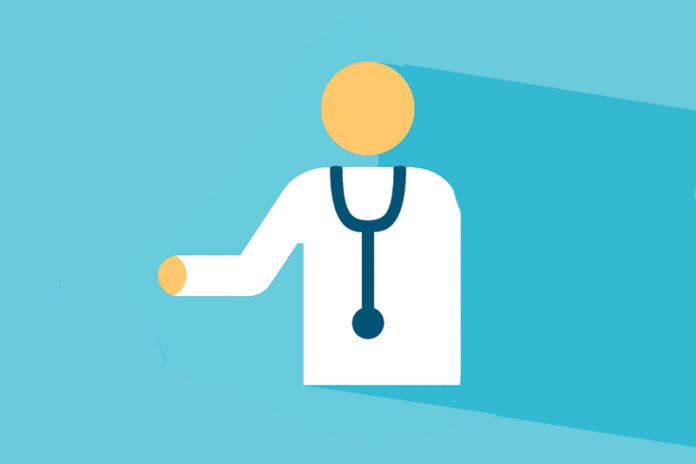
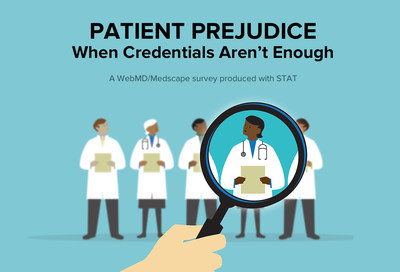
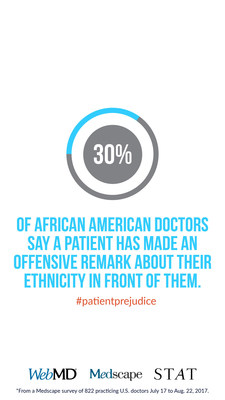
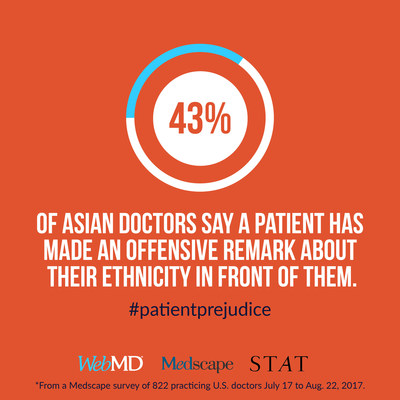
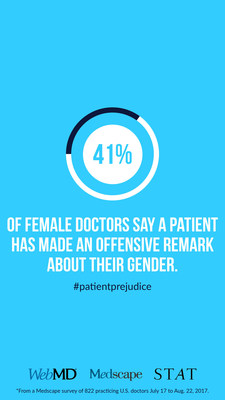
A dermatologist looked to be around 18 years old. He was going to perform minor surgery on my face. I was greatly concerned about his experience. I now have a considerable scar there. Perhaps it would be there if a more experienced doctor did the same procedure, but at the time that doctor wasn’t holding the knife.
Great articles; keep them coming. Thx